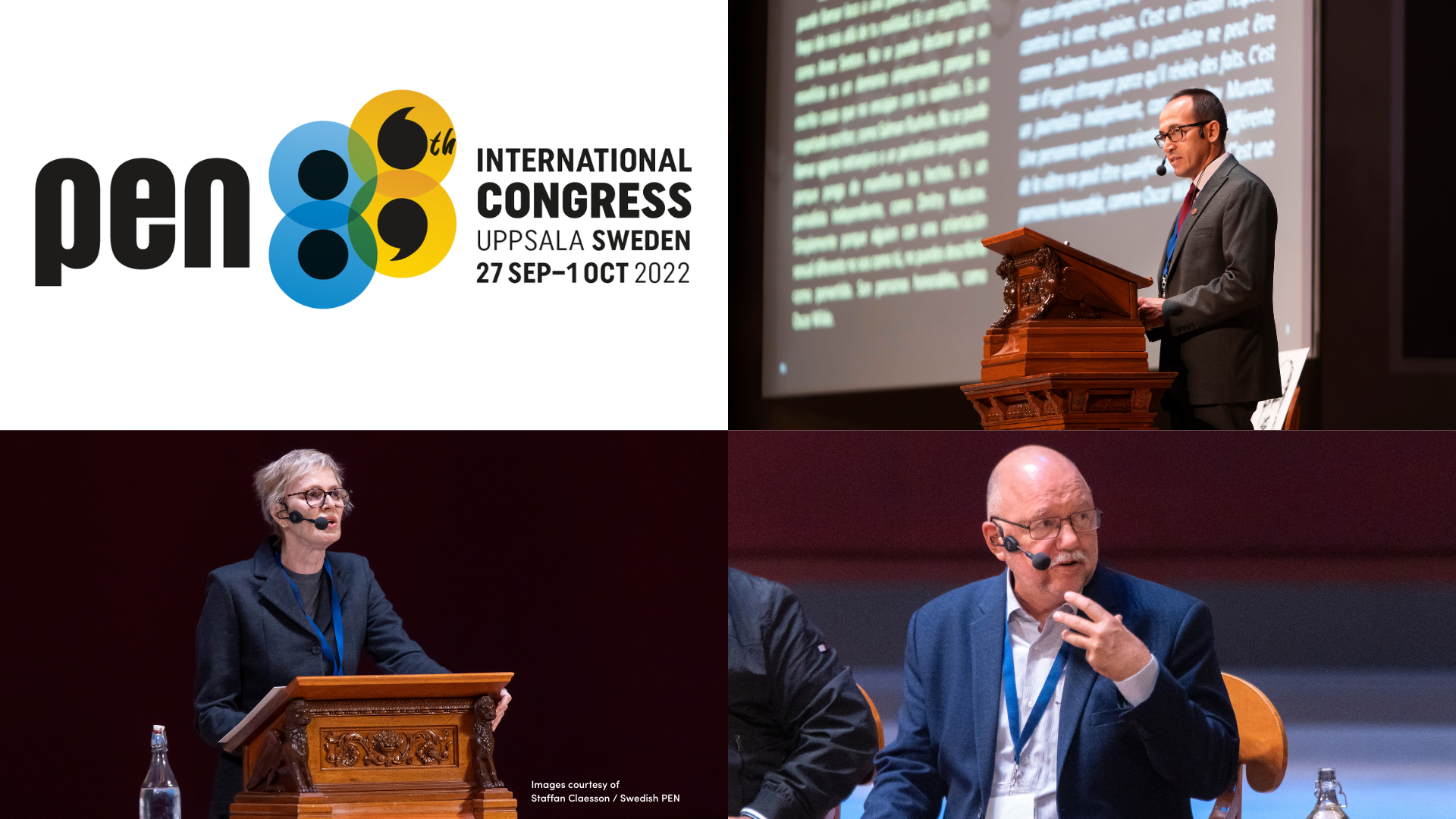PEN International closes its 88th Congress: The Power of Words: Future Challenges for Freedom of Expression
Photos: Courtesy of Staffan Claesson
31 October 2022: PEN International’s 88th Congress: THE POWER OF WORDS – Future Challenges for Freedom of Expression took place in Uppsala from 27 September – 1 October 2022, hosted by Swedish PEN. The week-long programme brought together 400 writers from over 100 PEN Centres, to debate, challenge and reinterpret PEN’s understanding of issues such as hate speech, digital surveillance, climate change, war and post-conflict, as well PEN’s work moving forward.
“As we are witnessing the emergence of new ways to self-express and exercise the right to hold opinions, receive information and ideas, and impart information, literature is taking on new forms, and with that also the way freedom of expression is challenged, controlled, restricted or completely and forcibly put to an end. One hundred years since our foundation, it is now more important than ever to develop new ways to defend and embrace freedom”. Burhan Sonmez, PEN International President.
Highlights of this year’s gathering were four online events featuring a line-up of acclaimed literary voices:
OPENING CEREMONY: Premiered with speeches by Burhan Sonmez, PEN International President, and Jesper Bengtsson, Swedish PEN President, Congress’s opening ceremony included THE POWER OF WORDS, a keynote speech by acclaimed American novelist and essayist Siri Hustvedt; and UKRAINIAN LITERATURE SET FREE, a panel discussion on the depth and complexity of Ukrainian literature- between Ukrainian writers Andrei Kurkov, Lesyk Panasiuk and Daryna Gladun, moderated by literary critic Jenny Aschenbrenner.
“The role of the written word is not incidental to the threat of authoritarianism. Although words serve as masks for authoritarian ideologies, they are also vehicles of liberation from them.” Siri Hustvedt.
THE PROBLEM WITH HATE SPEECH: A discussion on the importance of countering the challenges posed by hate speech while guaranteeing freedom of expression- with authors Siri Hustvedt, Salil Tripathi, Danson Kahyana and Swedish PEN President Jesper Bengtsson;
“We should really work hard to insist that the word ‘dialogue’ carries within itself the expectation of an answer.” Danson Kahyana.
ABSENCE AND DISAPPEARANCE: An exploration of these notions in the context of societal and political struggle- with PEN International President Burhan Sonmez and Syrian writer Yassin Al Haj Saleh; and
“The story of enforced disappearance is in itself very big, we [Syrians] have more than 111K disappeared people whose fate is still unknown to their families or anybody. Mostly by the regime but also by other groups.” Yassin Al Haj Saleh
CULTURAL RIGHTS IN TIMES OF WAR AND POST-CONFLICT: a reflection on the need to safeguard and use arts, literature and culture to promote peace- with author Andrei Kurkov, blogger Hayder Hamzoz, editor Neelufer Suhrabi, academic Andrea Lesic and poet Germán Rojas.
“Cultural rights are not only about literature, about museums, but about the cultural landscape in which the nation lives.” Andrei Kurkov.
THE DANGER OF WRITING ABOUT CLIMATE CHANGE: A seminal discussion on what climate change means for the protection of writers at risk and PEN’s work - with Mexican American author Jennifer Clement and Swedish journalists Erik Halkjer and Henrik Brandao Jönsson. Moderated by publisher Kerstin Almegård, this event featured poetry readings by Jonas Gren.
“It’s very important that we stand together and connect our struggles and networks as writers, journalists, and defenders of free expression.” Erik Halkjer.
BACK TO THE FUTURE: A reflection on PEN International’s achievements in its first century and its work moving forward- featuring PEN International President Burhan Sonmez in conversation with former PEN International Presidents and writers Jennifer Clement, Homero Aridjis and Per Erik Wästberg.
Central to the five-day programme was the adoption by PEN Centres of 5 resolutions on the critical situation in Cuba, and the war in Ukraine, the repression of Kurdish language and culture in Türkiye, the prosecution and extradition of Julian Assange, and the threats to freedom of expression and protection of civic space.
Other defining moments included the admission of PEN Sri Lanka and PEN Armãn as new Centres, bringing the total number of PEN Centres representing writers across the world to 147, as well as the election of Regula Venske (PEN Germany) as International Secretary; Gabriel Seisdedos (PEN Argentina), Beatrice Lamwaka (PEN Uganda) and Tanja Tuma (PEN Slovenia) as Members of the Board at Large; German Rojas (PEN Chile) as Chairperson of the Writers for Peace Committee; and Elisabeth Nordgren (PEN Finland) and Terry Carlbom (PEN Sweden) as Vice Presidents of PEN International.
As per tradition, PEN International honoured absent writers, imprisoned or killed for protecting freedom of expression, with an Empty Chair: Julian Assange (UK), Innocent Bahati (Rwanda), Ahmed Douma (Egypt), Narges Mohammadi (Iran), Dom Phillips (Brazil), María Cristina Garrido Rodríguez (Cuba), Salman Rushdie, Phạm Đoan Trang (Vietnam), and all journalists and media workers covering the war in Ukraine.
This was the very first in-person Congress since the beginning of the Covid-19 pandemic. Other notable participants to the Uppsala’s gathering included, among others, writers activists and PEN’ cases: Dareen Tatour, Ma Thida, Danson Kahyana, Iman Humaydan and Dmitry Strotsev.
Notes to editors
For further information, and for international press, please contact Sabrina Tucci, PEN International Communications and Campaigns Manager, [email protected], Twitter: @pen_int | Facebook ww.facebook.com/peninternational| www.pen-international.org

